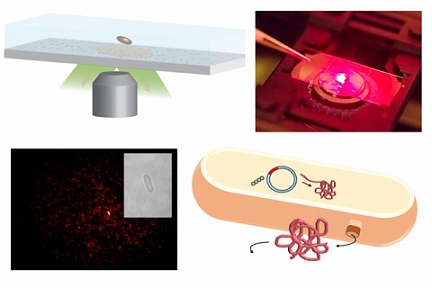 Carbon nanotubes, normally used for computer are now being applied to medicine and chemical engineering by a group of researchers at MIT. According to paper published in the journal Nature Nanotechnology, MIT engineers have modified carbon nanotubes to create instruments that are sensitive enough to detect a single protein molecule as it is secreted by a cell.
Carbon nanotubes, normally used for computer are now being applied to medicine and chemical engineering by a group of researchers at MIT. According to paper published in the journal Nature Nanotechnology, MIT engineers have modified carbon nanotubes to create instruments that are sensitive enough to detect a single protein molecule as it is secreted by a cell.
Nanometer-thick carbon nanotubes naturally glow when exposed to laser light, but when coated in materials that bing to target molecules, these nanotubes become sensors. The researchers coated the nanotubes with chains of DNA called aptamers, enabling the target molecule to bind to the DNA chains and causing the nanotube’s glow to become measurable. The “sensor array” is set up on a microscope slide and when a cell is placed inside the array, the sensors will detect the presence of the target protein.
Researchers have only tested the system with two different proteins so far, but believe the system could lead to new breakthroughs in biopharmaceutical treatments as well. With other researchers working on ways to re-engineer patient’s cells to secrete beneficial proteins, the new MIT sensor array system would be crucial to testing those treatments, as well as studying viruses, neurotransmitters and quorum sensing.
Whether its micro-components, sensors, or labware, Eclipse Automation has the skills and experience to design an exceptional turn-key solution for all your life sciences needs. All equipment is developed to GAMP standards throughout each step of the project to guarentee only the highest quality products, and Eclipse’s diverse testing and inspection capabilities ensure that your automated solutions functions at optimal capacity.
Source: Engadget



